- Home
- William Shatner
Captain's Glory зпвш-9 Page 7
Captain's Glory зпвш-9 Read online
Page 7
“Their ship exploded,” Riker said slowly, remembering those last awful moments.
Picard’s gaze met his squarely. “But their tactic worked. The Araldii cut the intensity of the radiation hitting the Titan by more than sixty percent. Your… shall we say, ‘audacious’ maneuver with the quantum torpedoes created a counter pressure wave that deflected another ten to fifteen percent. What was left, your shields handled easily. By the time the charged particles and stellar gas reached the Titan, your engineering crew had full impulse restored and were able to outrun them.”
Riker felt simultaneously proud of his crew, and dis-traught over the loss of Fortral’s ship and crew. But one detail remained unexplained.
“Did the engineers install the Titan’s backup warp core?”
Riker saw in Picard’s eyes that that was a detail he’d deliberately withheld.
“No,” Picard admitted. “Under orders from Command.”
Riker instantly made the only logical connection.
“The cores were sabotaged?”
“I wish it were that easy.” Picard sighed again, and tugged his shirt in a needless attempt to straighten its perfection. “The reality is that no one knows what’s happened over the past ten days. Warp cores are malfunctioning, running critical, even breaching, across both quadrants.”
Riker stared at his former captain. He didn’t even know where to begin asking questions.
“For now,” Picard continued, “the best theory is that our section of the galaxy is passing through a region of space-time with altered subspace properties. Starfleet thinks it might be related to the subspace instabilities that build up over well-traveled shipping lanes.”
“But we corrected that problem years ago,” Riker said, struggling with disbelief. “Modified our engines, and…”
Picard didn’t let him finish. “Whatever it is, it’s a different phenomenon. On the plus side, Starfleet hasn’t lost many ships because of our automated warp-core ejection procedures. But dozens of freighters have been lost. Hundreds of private ships. Vulcan shipping is at a standstill. Officially, the Klingons aren’t admitting to anything out of the ordinary, but our listening posts have picked up scores of distress calls.”
“So the Araldii ship…?”
“I’m sure they didn’t intend to sacrifice themselves for you. But whatever happened to the Titan’s warp core also happened to theirs, and they weren’t able to eject it.”
Riker stared up at the sickbay’s overhead, trying to comprehend the implications of all that Picard had told him. But gradually he became aware of another familiar sensation: the heartbeat of the ship he used to serve on.
“The Enterprise is at warp,” Riker said. “I can feel the generators.”
Picard nodded, unperturbed. “Certain types of cores appear to be unaffected. Older ones, especially.”
“This ship isn’t old.”
“Our last refit, after our collision with Shinzon’s vessel… there weren’t enough warp cores to go around. We had a Block Five installed, and I’ve had to listen to Geordi complain about it ever since.”
Riker tried to ignore the pounding in his head and failed. “The Titan has a Block Seven.”
“Not once we get back to Mars.”
“A refit? Already?”
“Starfleet’s replacing warp systems on all affected ships. The program’s likely to take years. Sovereign-, Forrest-, and Luna-class ships have priority.”
“Years?” Riker repeated.
Picard’s next words were even more disturbing. “We’ve lost more than ships and installations powered by static warp-field generators. We’ve lost virtually every major warp-core research and manufacturing facility. Including the Cochrane Institute.”
Riker stared at Picard. “On New Montana?”
“Death toll in the hundreds. Most of them warp specialists.”
Riker’s astonishment quickly changed to suspicion. Warp travel was the lifeblood of the Federation. It was what allowed Starfleet to exist. The fact that warp technology was being denied to both entities, and that the scientists and engineers responsible for creating and improving it had been killed, also led to a single, logical conclusion-but one that Picard had already denied.
“Starfleet’s certain this isn’t deliberate?”
Picard shook his head. “I had my doubts, too. But this is so widespread, across thousands of light-years… what kind of an enemy could strike us like that? By changing the fundamental characteristics of subspace?”
“The most dangerous enemies are those we can’t predict.”
Picard patted the arm of his former first officer. “Nature’s unpredictable, but I’m not willing to call it our enemy yet.”
But Riker wasn’t willing to rule out any enemy.
Not even a force of nature.
8
THE GATEWAY, VULCAN
STARDATE 58562.5
Entering this desert was little different from stepping into a blast furnace, but to Kirk, the searing wind carried treasured memories and the promise of home.
That’s what Vulcan was to him now: a second home, his brother’s home.
He pulled back the hood of his cooling cloak to feel the force of that wind and catch the faint, ozone scent of distant sandfire storms.
“Is that wise?”
The holographic doctor stood with Kirk and Joseph on the viewing platform that was carved into an immense formation of wind-eroded rock. Far below was the haphazard community of low, round, sand-colored hostels and hotels that huddled together at the desert’s edge-their apparently random distribution unusual for Vulcan, a sign of the age of this place, pre-Surak and logic.
Tradition held that from the Gateway, Surak had begun his journey of enlightenment through the desert known as the Forge. From that crossing, taken more than two thousand years ago, the Vulcan pursuit of logic had arisen.
Though the holographic doctor didn’t require it, like Kirk and Joseph he also wore a cooling cloak of red-orange cloth over his projection of civilian clothes, the better to blend in with pilgrims and tourists. In the Doctor’s case, the sophisticated heat exchangers that were woven invisibly through the cloak’s coarse fabric were not switched on.
“Solar radiation levels are considerably higher than on Earth,” the hologram warned.
Kirk knew the Doctor meant well and forgave his concerns. Caution was undoubtedly part of his medical programming; inevitable, given his origins. After the first time they had met, Kirk had reviewed the Doctor’s design specifications. The hologram was a composite expert system incorporating the life experiences of at least forty-seven medical specialists.
“I’ve spent enough time here,” Kirk said. “I know when to go indoors.” He could have but didn’t add that it sometimes felt as if he’d spent lifetimes on this world-the residue, he knew, of mind-melds with Sarek and Spock that had left him with the echoes of memories from generations of Vulcans.
“Dad, can I try?”
His son was looking up at him through tinted eye-shields, his hands already on the edges of his own cooling cloak. Surprisingly, one of the few Vulcan physiological traits Joseph did not seem to have inherited was a protective inner eyelid.
Kirk nodded.
Joseph pulled back his hood and, just as Kirk had done, took a deep breath of the hot dry wind.
Kirk felt a pang of mortality when he saw his son duplicate his actions so precisely. It was another reminder that Joseph would be his living legacy, a reflection of all that he had been long after his own time had ended. Knowing that, Kirk had done all he could to ensure that Joseph would be exposed only to the good in him, to carry only that part forward. But sometimes he worried he hadn’t done enough. Joseph was a sponge for all that his father was, good and bad.
Fortunately, his son had other role models to emulate: Scott and McCoy and, until last year, Spock. Kirk could only trust that his friends’ guidance and examples would help balance those times when he himself hadn’t been at his be
st.
Joseph took another deep breath, frowned almost comically. “It smells like… engineering.”
Kirk understood the familiar scent that his son had detected. “Energy discharges,” he explained. He pointed out to the horizon. It shimmered with heat where the red of the sky smeared into the red of the land. “There’s a region out there where the planet’s magnetic field was distorted a long time ago.”
Kirk saw no need to tell his son the story of Vulcan’s ancient atomic wars right now, and how they had devastated this world. There’d be time enough to share those dark shadows of Vulcan’s history when he was older.
“It’s almost like a third magnetic pole. Disrupts most electrical and transtator current in the area, lets the absorbed energy leak out into the wind. Creates spectacular lightning displays in billowing clouds of sand.”
Kirk caught Joseph’s glance and remembered looking at his own father that way, wondering if there was anything the man didn’t know.
But for Kirk, hero worship was not required. He only wanted to be a father to his son. “I read all that in the guide padd. You should look at it tonight. Scotty could probably give you a hand with the equations for the energy interactions and…”
Joseph turned away with a familiar expression of impatience bordering on rudeness. Kirk leaned closer to him, dropped his voice so Joseph wouldn’t think he was being chastised in front of the doctor.
“You know our deal. Most children have to spend time in school. But as long as you’re on the Belle Reve, you– “
“You don’t have to turn everything into a lesson.”
Kirk saw the holographic doctor looking in the opposite direction, as if there was suddenly something utterly fascinating on the horizon.
“Joseph… what have I said about using that tone of voice?”
Joseph pressed his lips together, and Kirk could see he was determined not to admit any guilt. The boy’s features bore little actual resemblance to those of his father, but for a moment, seeing that defiant attitude in his son, Kirk might as well have been looking into a mirror.
“We can drop the subject for now,” Kirk said, falling back on a strategy that had worked before-sometimes, “as long as you agree we’ll discuss it tonight.”
Joseph hesitated for a moment, then conceded. “Yeah.”
Kirk moved to reward his limited success. He pulled a hotel voucher padd from his belt, tapped in a spending limit, then handed it to his son. “Why don’t you go get a jumja.” There was a confectionery stand at the base of the wide, carved stone stairway leading up to the platform. Vulcans didn’t have much of an appetite for sugar, but the stand did brisk business with offworlders.
Joseph’s struggle with pride was brief. He took the padd with a glimmer of a smile. “Thanks, Dad.” He looked past Kirk. “Doctor, would you like…” Joseph paused, awkward, as he remembered exactly what the Doctor was.
The Doctor smiled at the boy. “No, but thank you for asking.”
“Come right back,” Kirk said, and with that Joseph shot off in escape, expertly weaving through the crowd, cloak flapping behind him like a cape.
“You must find it an interesting experience,” the Doctor said.
“I can think of a few other adjectives that’d fit, but ‘interesting’ works, too.”
“Are thee Kirk?”
Kirk turned abruptly at the sound of his name, spoken with the soft, archaic accent of a Vulcan schooled in one of the planet’s ancient scholar’s dialects.
The Vulcan standing before him was female, clothed in a simple dark brown robe with a tan overvest. Most notably, though, her head was shaved. Kirk recognized the significance of both her clothing and appearance. They revealed that she was a Surakian. The school of logic to which she belonged was one of the most demanding in Vulcan tradition. Its adherents attained the Kolinahr through the strictest interpretation of Surak’s teachings. And that included the rejection of all personal possessions, all ornamentation, everything that was not necessary for the pursuit of knowledge.
Kirk also knew who she was. He bowed his head in respect. “Scholar T’Vrel. Thank you for seeing me.”
T’Vrel ignored Kirk’s statement, looked closely at the Doctor. “What are thee?”
“Like yourself, madam, I am a healer.”
T’Vrel’s neutral expression did not change, and Kirk realized that he couldn’t tell if she was fifty years old, or, instead, one or two centuries.
“Thou are not real,” T’Vrel said.
“I assure you, I am very much real,” the Doctor insisted. “My physical form is generated holographically, but– “
T’Vrel turned to Kirk as if the Doctor were no longer there. “Ask thy questions, Kirk,” she said.
“Is this the best place for our conversation?” Kirk replied. The message he’d received in response to his query to one of Spock’s ambassadorial apprentices had told him to meet T’Vrel on this platform. But meeting in such an exposed location and talking here were two different matters.
“There are many outworlders here. It is not unusual for Vulcans to be seen talking with them.”
Kirk decided that if T’Vrel was comfortable here, then so was he.
“I’ve been told you worked with Spock on Romulus,” he said.
T’Vrel did not respond.
Kirk had seen this form of Vulcan logic at work before. She would say something only to correct him, or to answer a question. He continued, unperturbed.
“You were with him when he was abducted by the Remans working for Norinda.”
“That name is not familiar.”
“She was the leader of the Jolan Movement on Remus.”
Again T’Vrel gave no response.
“I believe Norinda is also responsible for Spock’s disappearance.”
“Explain.”
Kirk tried his best to comply. “Despite appearances, she wasn’t… humanoid. I saw her dissolve into black dust… black smoke… black sand… something… a substance or phenomenon that then captured Spock and absorbed him into it.”
Though T’Vrel remained impassive, Kirk sensed the time she had allotted to him was rapidly diminishing.
“I also believe Spock’s not the only one who met that fate.”
“I have no time for what thee ‘believe.’ I meet with thee because thou are Spock’s friend. Ask a question, or end the conversation.”
“You asked me to explain.”
“Yet thee do not.”
“I believe Spock is still alive, and I believe the way to find him is to find Norinda.” Kirk felt secure in that statement, knowing Janeway had also reached the same conclusion.
T’Vrel angled her head by millimeters, and considering her lack of reaction thus far, to Kirk it was as if she had applauded in enthusiastic agreement. “Logical,” she said.
Hoping that T’Vrel’s response was acceptance of his explanation, Kirk finally asked his question.
“I’ve been given reason to suspect that Norinda, or others acting on her behalf, might be on Vulcan, attempting to do here what she attempted on Romulus and Remus. Are you aware of any political, philosophical, or academic movement on Vulcan that fits that profile?”
For the first time, T’Vrel took her attention away from Kirk and glanced around at the other Vulcans and aliens on the viewing platform. When she looked back at Kirk, she gave no indication of what she was thinking, yet from her next words, Kirk could guess.
“Come with me to my s’url.”
Kirk recognized the Vulcan word. T’Vrel had invited him to her school-the closest thing a Surakian had to a home.
“Of course. I’ll get my son,” Kirk said.
“This is not a matter for children.”
Kirk looked at the Doctor.
“I’ll be happy to take Joseph back to the ship,” the hologram said.
Kirk and the Doctor walked with T’Vrel toward the staircase. “I’ll just tell my son where I’m going.”
T’Vrel said nothing.
Again, Kirk took her silence as acceptance.
At ground level, a noisy, grunting group of Tellarites jostled around the confectionery stand. While T’Vrel waited by an ornately carved stone baluster at the base of the staircase, Kirk and the Doctor squeezed past the Tellarites.
Kirk sighed. There was no sign of Joseph at the counter. He scanned the small plaza ringed by restaurants, shops, and hotel entrances.
“I don’t see him,” the Doctor said at Kirk’s side.
“He has a voucher padd,” Kirk said with a parent’s wisdom. “He’s probably in one of the shops.”
Kirk reached inside his cooling cloak and tapped the combadge pinned to his shirt. To all outward appearances, it was a plain silver disk with a manufacturer’s symbol embossed in its center, no different from any other civilian model. Inside, though, it had the latest Starfleet circuitry and could operate through subspace at ranges approaching several light-days. “Kirk to Joseph,” Kirk said.
He waited a few seconds, in no mood for his son’s games. Annoyed, he tapped the combadge again. “Kirk to Belle Reve.”
This time the reply was almost instantaneous. “Scott here, Captain.”
“Scotty, lock on to my signal and Joseph’s and tell me where he is.”
Kirk heard the engineer’s knowing laugh. “Up t’ his old tricks, is he?”
Kirk didn’t have time to explain. He didn’t know how long T’Vrel would wait. “Just stand by to beam him up along with the doctor.”
“Aye… I’ve got him. Five meters south of your position.”
“Five meters…” Kirk said. He looked south.
The confectionery stand.
Kirk checked that T’Vrel hadn’t left, then quickly walked back to the stand, certain Joseph was hiding behind it. The doctor helpfully skirted the Tellarites and went around the other side.
They met at the back. No Joseph.
Kirk tapped his combadge again. “Scotty, where’d he go?”
“Och, he hasn’t moved. You’re within two meters of him.”
Kirk looked around, truly puzzled, his frustration at Joseph’s timing tempered by his admiration for his son’s renowned skill at hiding.
He looked at the back of the confectionery stand. “He’s got to be inside.”

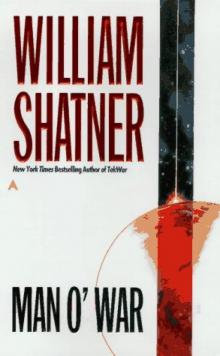 Man O' War
Man O' War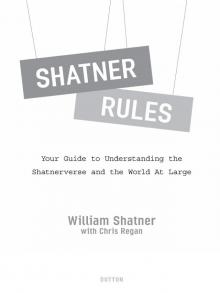 Shatner Rules
Shatner Rules Leonard
Leonard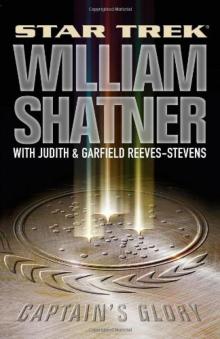 Captain's Glory
Captain's Glory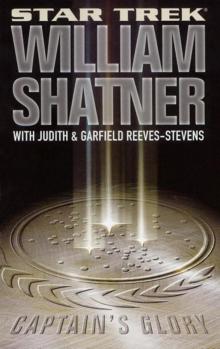 Captain's Glory зпвш-9
Captain's Glory зпвш-9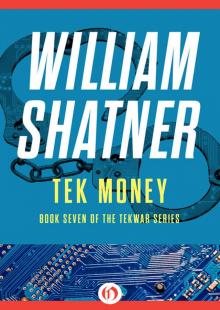 Tek Money
Tek Money Spirit of the Horse
Spirit of the Horse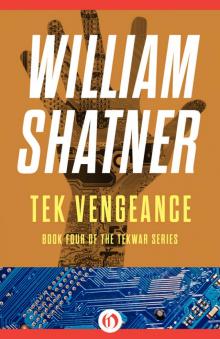 Tek Vengeance
Tek Vengeance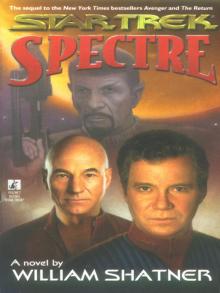 Spectre
Spectre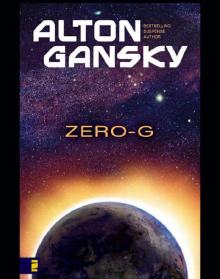 Zero-G
Zero-G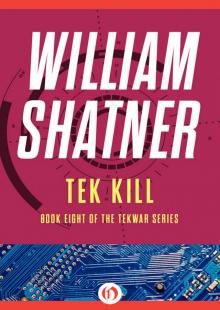 Tek Kill
Tek Kill Collision Course
Collision Course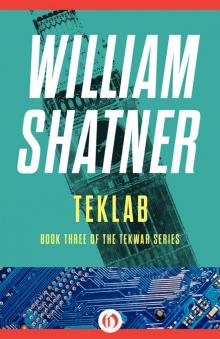 TekLab
TekLab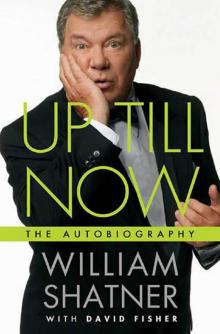 Up Till Now
Up Till Now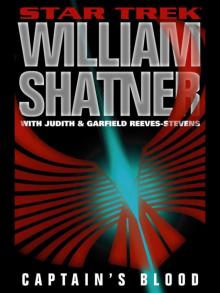 Captain's Blood
Captain's Blood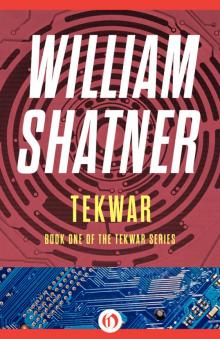 TekWar
TekWar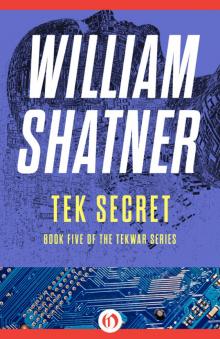 Tek Secret
Tek Secret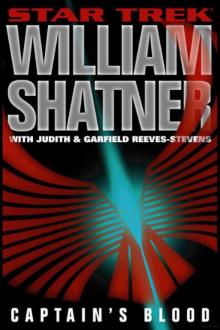 Captain's Blood зпвш-8
Captain's Blood зпвш-8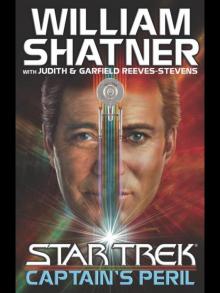 Captain's Peril
Captain's Peril Live Long and . . .
Live Long and . . .